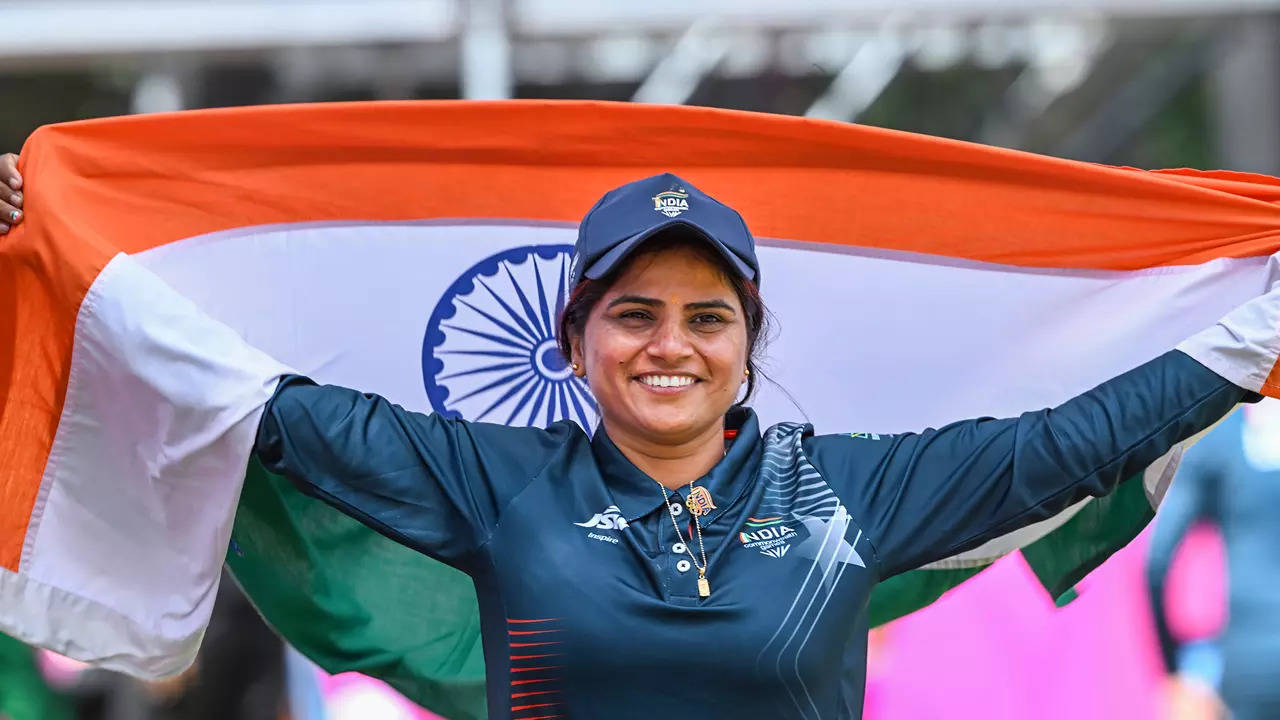
NEW DELHI: Lead. Skip. Jack. Ends. Box measure. The vocabulary of sports fans, even some experts, underwent a test earlier this week. It's not usual to come across the above terms in the realm of sports in India, because the country hardly followed the sport of 'lawn bowls' until three days ago. It was like golfer Aditi Ashok waking India up at 4 am from Japan last August, forcing the country to google par, birdie, eagle, albatross, etc., when she got herself in the reckoning for a medal at the Tokyo Olympics. She narrowly missed a podium-finish. But a quartet of Indian women on the bowling greens of Victoria Park at the 2022 Birmingham Commonwealth Games said to themselves: "Iss baar to karna hai" (we have to do it this time). And they won a historic gold.
India listened to Rupa Rani Tirkey very carefully on live broadcast. She is the 'Skip' of the Indian 'Women's Fours' lawn bowls team, comprising Lovely Choubey (Lead), Pinki (Second) and Nayanmoni Saikia (Third) as the other three members. That's the order in which they bowl. The 'Skip' gets the last turn to bowl.
Rupa the 'Skip', who is a District Sports Officer from Ranchi, was telling her teammates how to release the ball and what line to bowl so that it turns and ends up closer to the 'Jack'.
Watching a sport for the first time is like reading credits rolling on the screen: who is who and what is what?
The 'Jack' is a yellow ball. The players have to bowl (the balls) in a way that they turn and roll up closest to the jack. The team that has more balls closer to the jack compared to the opponents' gets the most points at the completion of an 'End'. The distance between the Jack and the balls is measured by a device called 'box measure'.
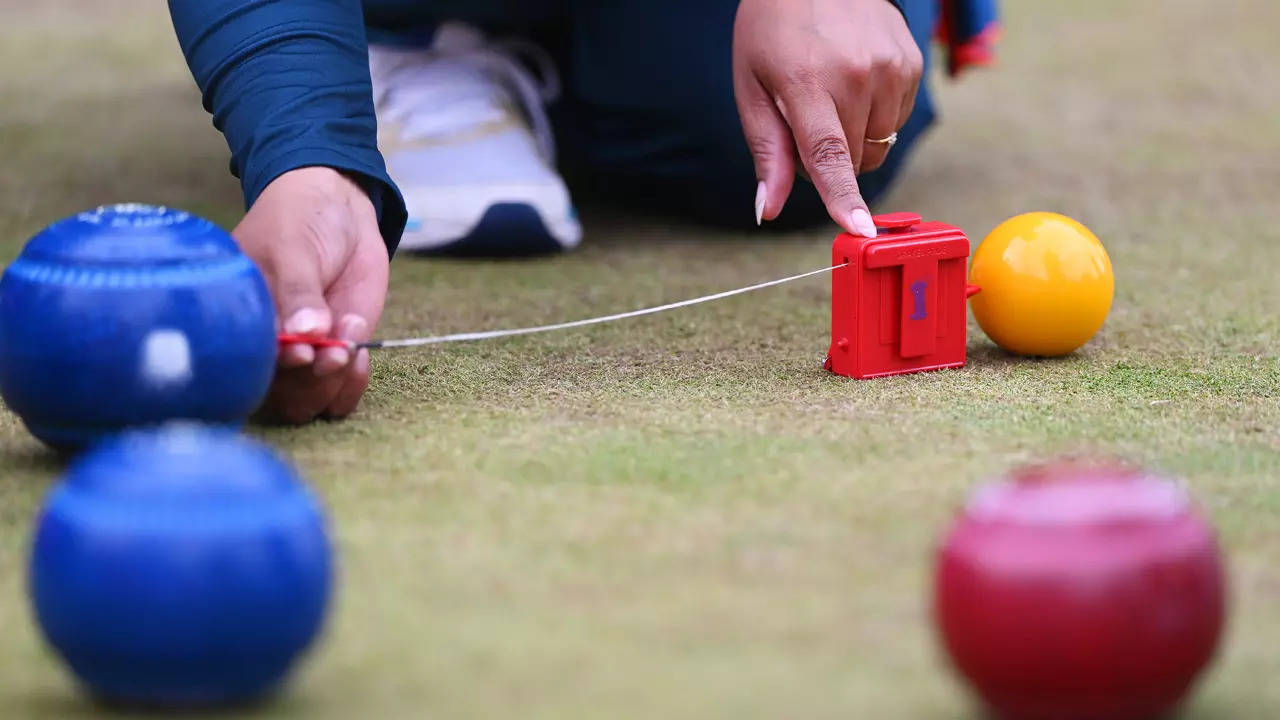
(A player using the 'box measure' to mark the distance from the Jack, i.e., the ball in yellow - Getty Images)
The credits roll again.
An 'End' is lawn bowls' synonym for a 'round'. A 'Women's Fours' match has 15 Ends, in which each team members bowls two balls per End. The other three formats are Singles, Pairs and Triples.
Facing the team from South Africa, who were runners-up in the 2018 CWG 'Women's Fours' event, the Indian players had a big task on their hands. Having already secured a historic medal by entering the final can sometimes alter focus. But if Rupa's one throw during the semifinal against New Zealand was anything to go by, this Indian team was in with a good shout. Rupa's one attempt ended up having four Indian balls closer to the Jack, thus fetching India four points. That can happen by knocking the Jack away from the opposition's clutch, so that more of your team's balls end up closer to the Jack.
High on confidence, Rupa was vocal like a director at a movie shoot, as Pinki, a physical education teacher in a Delhi school, stepped on the mat to bowl.
"Idhar se fenkna to yahan se andar ghumega (bowl it from this side so that it turns towards the inside)." It was like the former India cricket captain MS Dhoni instructing his spinners. Incidentally, like Dhoni, Rupa too hails from Ranchi.
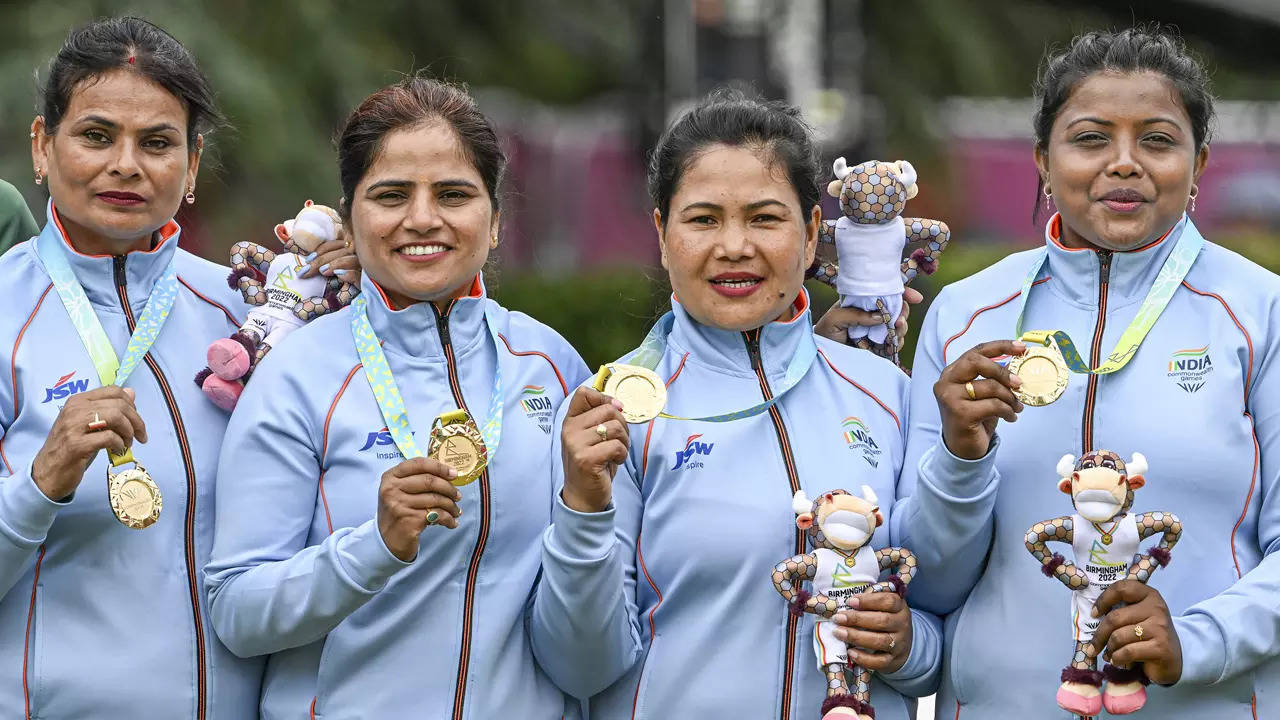
(From left, Lovely Choubey, Pinki, Nayanmoni Saikia and Rupa Rani Tirkey - PTI Photo)
The other two members of the team, Lovely, a cop with Jharkhand Police, and Nayanmonia, a forest officer from Assam, were patiently watching.
"The Skip is always close to the jack," said Pinki, during a telephonic conversation with TimesofIndia.com from Birmingham. "She would know the best what direction to bowl in, what should be the speed, the weight, etc. So Rupa kept instructing us. The coordination between the four of us was very good."
Time to role the credits again.
When the word 'weight' is mentioned, it's in relation to the the balls that the players throw. It's a 'biased ball'. Biased means it's asymmetrical in nature -- one side is heavy and one side is light.
"The heavy side is always held towards the side we want the ball to curve/turn after we bowl it. The line matters, besides the weight that we need to control," Pinki explained to TimesofIndia.com.

(A clutch of 'biased balls' that are used in the sport of lawn bowls - Getty Images)
Before 2000, Pinki was literally playing 'a different ball game' as the captain of the Delhi University cricket team.
"I joined the Delhi Public School (DPS) as a physical education teacher, after I had done my diploma from NIS (National Institute of Sports) Patiala in cricket because I have played the Rani Jhansi Trophy," said the 42-year-old from Delhi.
The Rani Jhansi Trophy is an elite women's cricket tournament which is also one of the prominent routes to be in the reckoning for the Indian team.
"I have been a captain of the Delhi University team. When I joined my job at DPS, the then principal, Mr. DR Saini, asked me introduce lawn bowls because in 2007, at my first National Games, I had won a silver medal. That's where this journey started," said Pinki, without touching on the reasons why she chose not to continue playing cricket professionally.
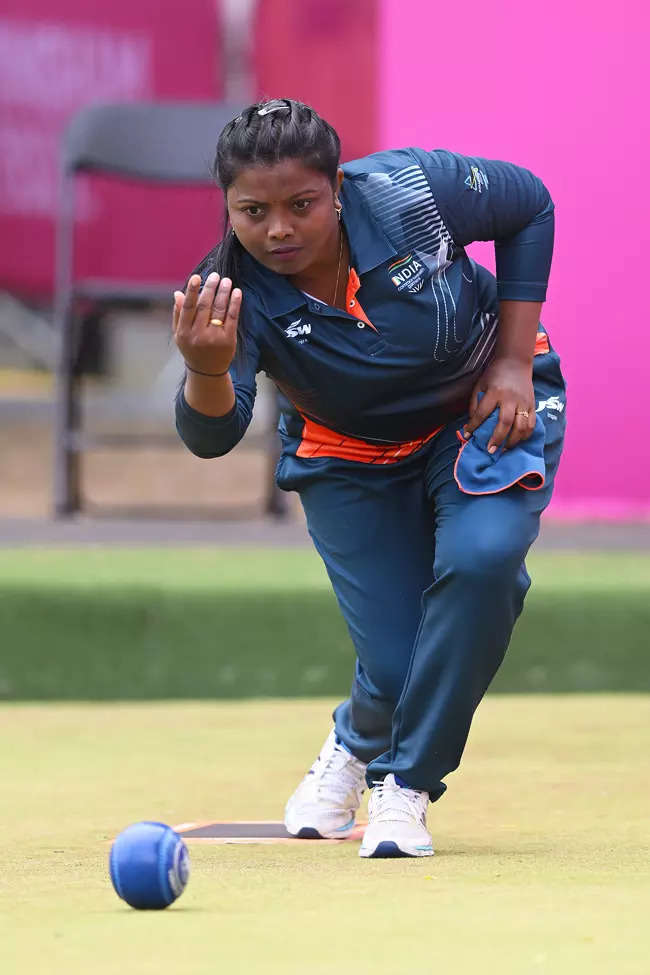
(Rupa Rani Tirkey - Getty Images)
Like her team members, Pinki has been a multiple-times medal winner from the Asian Championships. "I have won a medal in all the lawn bowls Asian Championships that have been held from 2009 to 2018, including gold," she categorically mentioned.
But the Commonwealth Games had not been a happy hunting ground for the Indian. Pinki featured in the three previous editions of the Games, but the Indian team never really looked like a medal contender, despite coming close on an odd occasion.
"Teams were good in the past as well, but the luck factor was not favouring us, sometimes performances used to fall, like we couldn't finish in the dying moments. We were lacking in the 'how to finish' (matches) department. But as we gained experience, it taught us how to do it (win)," Pinki further told TimesofIndia.com.
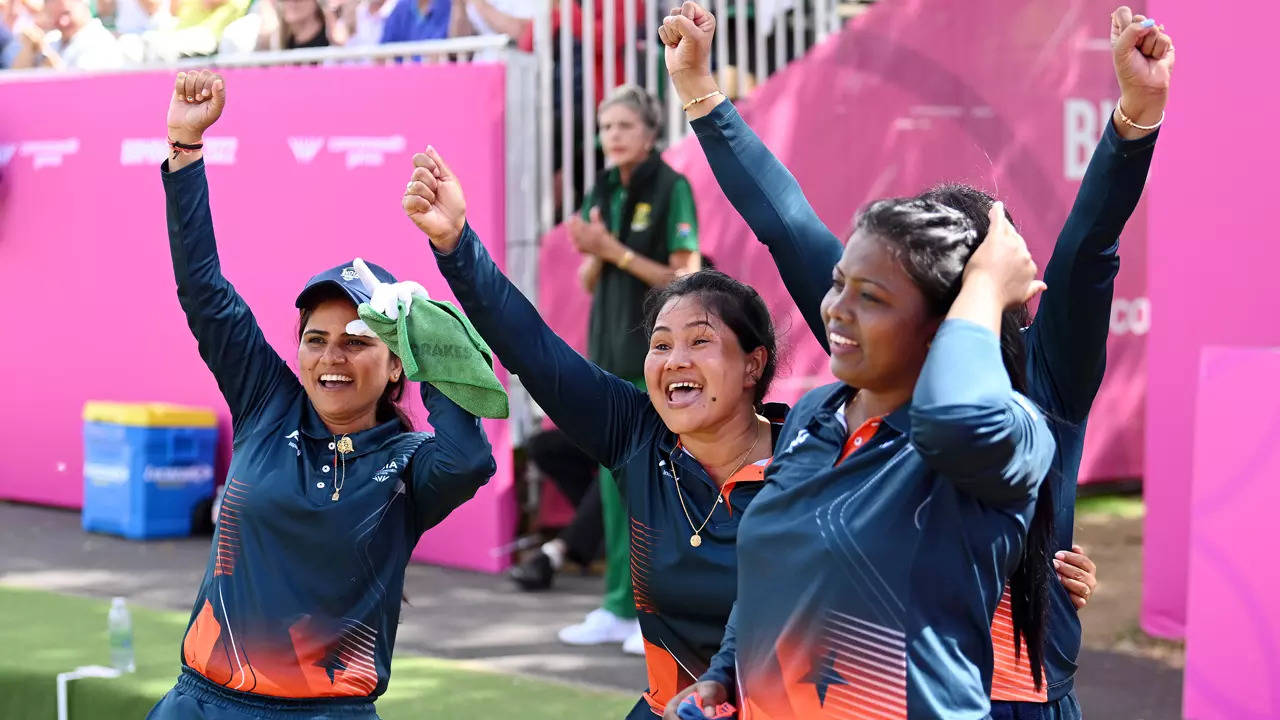
(The celebrations after the winning moment - Getty Images)
'ISS BAAR TO KARNA HAI'
Returning empty-handed is never a good feeling. Without mentioning it specifically, Pinki, at a personal level, wanted to repay the support and trust her family had always shown her ever since her parents recognised her enthusiasm towards sports.
"It's been three Commonwealth Games (without a medal) - 2010, 2014, 2018. We reach till the quarters and semis, and then return (empty-handed) from that stage. This time it was do or die for us. Whatever it takes, we didn't want to go back empty-handed," said Pinki.
India defeated South Africa 17-10 in the final. They led 8-2 at one stage before South Africa came back to lead 10-8. Like in the semis, it was Rupa again who finished the 12th End by drawing India level at 10-10. First she struck the jack and then bowled the second ball in a way that it ended up very close to the Jack.
"The kind of cheer and love we are receiving has told us what the importance of a medal is in a sportsperson's life," said Pinki. "Logon ne pehchanana shuru kiya hai (people have started recognising us). We were like 'ek medal to chahiye hi chahiye' (we want at least one medal at any cost), so that people come to us and ask us - what is lawn bowls?"
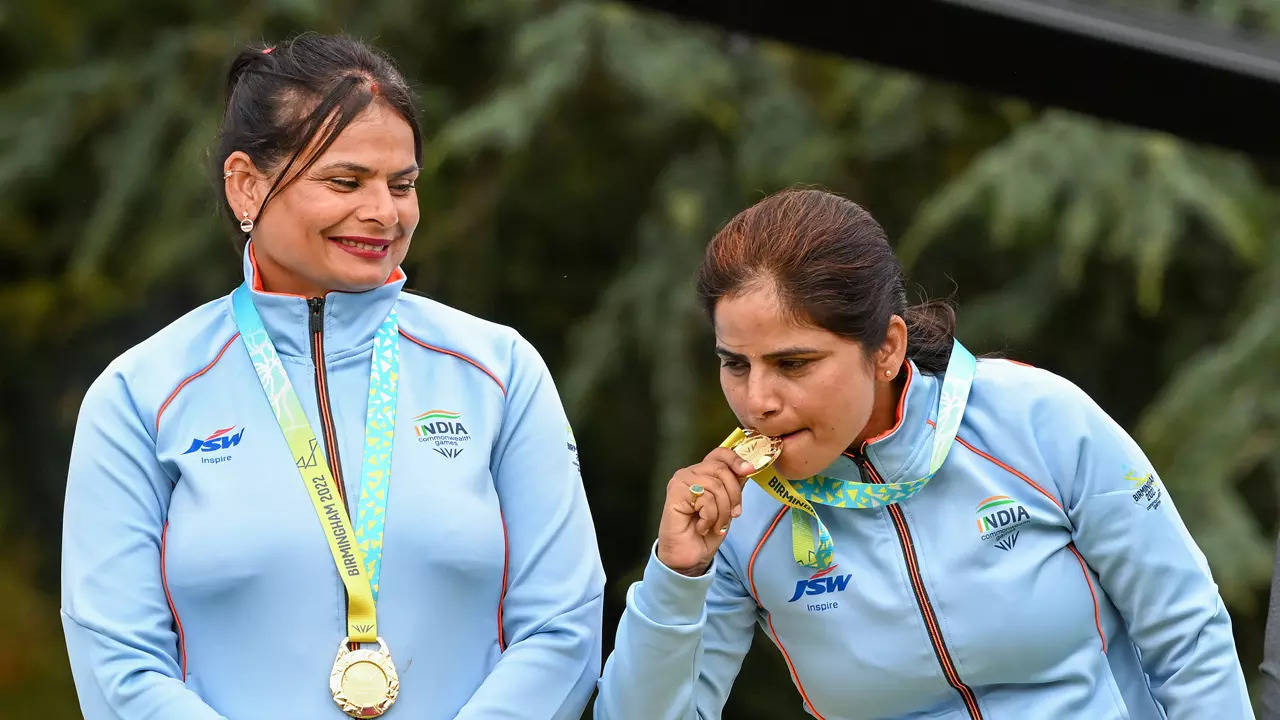
(Pinki bites her gold medal to pose for the photographers as teammate Lovely looks on - PTI Photo)
Is lawn bowls likely to get more support now after the CWG medal? Pinki was very honest in her reply to that question.
"Unless you do something, how can you expect people to look at it (positively). Now that we have done something, so obviously support will come.
"We have won medals in the Asian Championship, but you can now see for yourself what difference a Commonwealth Games medal can make. This medal has opened up another sport for the youth.
"Come and play," she said, before getting off the bus at Victoria Park.







